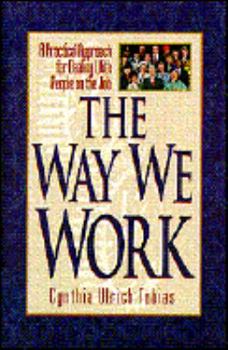The Way We Work
Select Format
Select Condition 
Book Overview
The key to success in the workplace is understanding the work habits of those around you. Cynthia Ulrich Tobias, president and CEO of Learning Styles Unlimited, unlocks the mystery behind our... This description may be from another edition of this product.
Format:Hardcover
Language:English
ISBN:1561794074
ISBN13:9781561794072
Release Date:January 1995
Publisher:Thomas Nelson
Length:154 Pages
Weight:0.52 lbs.
Dimensions:0.7" x 6.5" x 9.7"
Customer Reviews
4 ratings
The Way We Work Review
Published by Thriftbooks.com User , 15 years ago
If you have ever wondered how two supervisors or colleagues can react to the same situation totally differently, then you need to read The Way We Work by Cynthia Tobias (1999). This book outlines four dominating personality working styles, the differences between them, your own working style test, and how you can respond effectively and appropriately to situations with different dominating styles. The working styles are broken down by two classifications: the way we perceive (concrete, abstract), and the way we order (random, sequential). The four styles are: concrete sequential, abstract sequential, concrete random and abstract random. The book lays out simple quizzes for the reader to identify his/her working style. The chapters then outline personality traits of the style and go into detail of the characteristics of an employee and boss of that style. For example, the abstract random boss may keep his/her desk cluttered and have a half-empty coffee cup sitting around with piles of papers and files all over the desk. They also tend to avoid conflict with others. The abstract random employee cares about others and has a difficult time working with those who are not happy. Using the information in the book, one can have a deeper understanding of his/her working relationships (and personal relationships). Teachers could apply this information to students, particularly secondary students. Educators are continually collaborating in their field of work, and perhaps a better understanding of working styles would expedite and facilitate a positive and productive work environment. The layout of The Way We Work (Tobias, 1999) is easy to read with visual charts to identify, and it provides quick-reference lists for the reader. A caution, this book should not "label" anyone and should be used simply for consideration and perhaps insight as to why people interact with others at a place of work the way they do. The author provides a brief description of Howard Gardner's work on Multiple Intelligences, which may be the basis of writing this book. Learning styles and working styles could go hand-in hand. The author references studies and researchers; however, the reader is not cloaked by academic jargon, which makes the book easy and enjoyable to read. The Way We Work (Tobias, 1999) book provides an insight to building a positive working relationship with others.
Great Book, Enjoyabe Reading
Published by Thriftbooks.com User , 21 years ago
This was a wonderful book. I laughed throughout the entire book. It is so practical and applicable!
No more cookie cutter learning styles!
Published by Thriftbooks.com User , 25 years ago
The Way We Work by Cynthia Ulrich TobiasThe Way We Work is a wonderful followup to Ms. Tobias's previous book, The Way They Learn. As an entrepreneur and educator, I thoroughly enjoyed seeing these learning styles translated into workplace applications. Not only does the book encourage evaluation of our own learning styles, but teaches us how to get along with those having different learning and communication styles from our own.The author wisely discourages the use of labeling and cookie-cutter analysis, which is a refreshing approach. This is one I will quickly place on my recommended reading list for my students and colleagues alike. Well done!
A MUST READ FOR EMPLOYERS AND EMPLOYEES
Published by Thriftbooks.com User , 25 years ago
Forget over-priced feel-good sensitivity seminars. This book is full of common sense insights and ideas that will really make things better at work! Whether you are top level management, a worker bee, or somewhere in the middle you will benefit enormously by reading this book.





